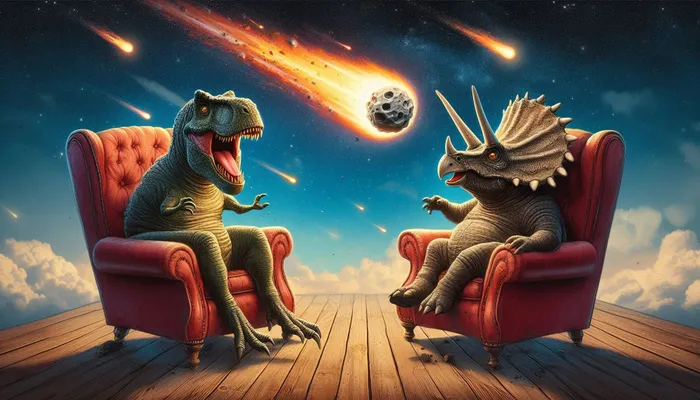‘Was that a comet?’
PERSPECTIVE

Picture: Image created using DALL-E, courtesy of MS Dabbler
By Monty Quill
SIXTY-SIX million years ago, in the twilight of the dinosaurs' reign on Earth, two colossal reptiles found themselves in the midst of a lively discussion - though "lively" might be a bit generous, considering what was about to happen.
Little did they know, a 10-kilometre-wide asteroid was set to crash-land in what would one day be called Mexico’s Yucatan Peninsula. In a matter of moments - geologically speaking - this "space rock" would be pulverised into oblivion, spreading its remains across the globe like a morbid confetti. The aftermath would leave behind the Chicxulub crater, 180km wide and 20km deep, and a global layer of clay, a souvenir from that unforgettable day when the dinosaurs learned the hard way that sometimes, the universe just doesn't play fair.
ALSO READ: Asteroid that doomed the dinosaurs originated beyond Jupiter
But let’s rewind to that fateful debate 66 million years ago. With the sky darkening and chunks of debris raining down, the dinosaurs faced the daunting task of making sense of the unfolding catastrophe.
A T-Rex, having just managed to free itself from a particularly stubborn patch of tar, craned its massive neck to peer through the swirling debris. “Did you see that?” it roared, its voice echoing across the land. “I thought I saw a comet!”
The second dinosaur, a somewhat more pragmatic Triceratops, turned its head slowly, its three horns glinting in the dim light. “Nope,” it said, with a note of weary exasperation. “That’s definitely not a comet. If I had to guess, I’d say this is more like an end-of-era special. And it’s happening right now. We’re talking a full-scale, cosmic catastrophe, live and direct!”
The T-Rex, clearly taken aback, stomped its foot in frustration. “An end-of-era special? What’s that supposed to mean? I was just getting used to the whole apex predator gig.
The Triceratops, maintaining as much patience as a dinosaur with a short temper could muster, continued, “Think about it. This isn’t some run-of-the-mill comet; it’s an all-out, cosmic demolition job. The kind that says ‘goodbye’ in a way that leaves no room for a comeback tour. It’s the ultimate ‘closing time’ signal for our era.”
The T-Rex, clearly still grappling with the reality of the situation, flared its nostrils. “Well, that’s a bit dramatic, don’t you think? Couldn’t we just, I don’t know, find a way to dodge it? Maybe there’s a nice cave somewhere that’s not on the guest list for this celestial event?”
The Triceratops shook its head. “Dodging it? This isn’t a minor meteor shower. This is the kind of celestial event that will turn the global real estate market into a wasteland. We’re talking a game-changer here. And by the looks of it, the game’s about to be over.”
As the two dinosaurs continued their debate, the sky grew darker, and the ground beneath them rumbled ominously. With each passing moment, the enormity of the situation became ever clearer. The dinosaurs’ discussion about the nature of the “comet” slowly gave way to the realisation that their world was indeed coming to a dramatic and irreversible end.
The T-Rex, finally accepting the gravity of the situation, turned to the Triceratops with a resigned sigh. “Well, if this is the end, I guess there’s nothing left to do but make the best of it. Maybe we should’ve tried to innovate a bit more with our evolutionary plans.”
The Triceratops gave a sympathetic nod. “Sometimes, you just have to accept that some things are beyond even our dinosaur-sized control. Let’s just try to stay calm and face this final act with some dignity. After all, if we’re going out, we might as well go out with a roar.”
As it turns out, the asteroid wasn’t just any run-of-the-mill space rock; a recent analysis of the debris layer has revealed that it hailed from beyond Jupiter, a carbonaceous beast, rich in carbon, and not a comet as some had suspected. But, of course, by the time this debate was settled, Rex and Tricera were long gone, leaving only fossils - and a cautionary tale about the dangers of underestimating space debris.